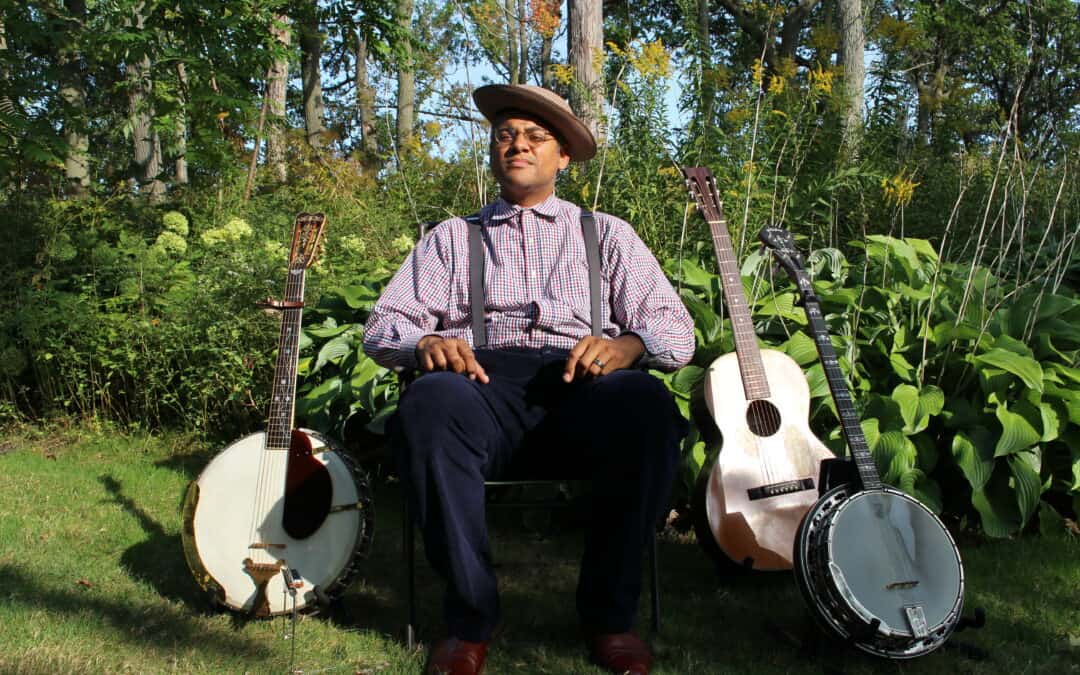A highlight of Swallow Hill Music’s first-ever BanjoFest is the appearance of Dom Flemons.
“The American Songster,” Flemons is a celebrated Grammy Award-winning musician, songwriter, and scholar. He is known for both his solo career, as well as being a member of the ground-breaking Carolina Chocolate Drops.
In addition to performing BanjoFest’s concert with Tony Trischka and Brad Kolodner, Flemons will also teach a workshop entitled Banjo Songster and Storytelling. When it comes to the banjo, his enthusiasm as an ambassador for the uniquely American instrument with African roots is unparalleled.
“The banjo is America’s one, true indigenous instrument,” Flemons said when asked if he could share one thing about the instrument to someone who might not know much about it.
Swallow Hill BanjoFest is on November 9: Get Tickets and Complete Details Here
“Even though it’s African-derived,” he continued, “it’s an instrument that became a phenomenon within the United States, and that’s something I think is one of the most important stories that we can tell about the instrument; it’s something that was created in the United States and it has continued to be a strong part of the musical culture.”
Flemons stressed the African roots of the instrument in tracing its history. “Its creation came out of this very harsh time of the early slavery period (that’s) connected to the Caribbean, and also back to Africa.”
“Once it makes its way into the United States,” he continued, “it mixes together with all the different cultures of the United States… then coalesces into this very powerful instrument, which is both an instrument of syncopation and rhythm, while also being an instrument of magnificent and quite immaculate melody at the same time.”
Flemons will demonstrate the versatility and complexity of the banjo’s musicality and history in his daytime workshop.
“I’m gonna go through quite a few different styles that I’ve learned over the years and that’s going to include a little bit of ragtime banjo, as well as some of the blues, and also string band music. I think that people are really going to get a good sense of the different ways that you can handle the banjo.”
He will share songs from what he calls “banjo songsters” reaching back from over a century.
”The songster is a musician who plays and sings a variety of material,” Flemons said. He first encountered the term from Paul Oliver’s 1984 book Songsters and Saints: Vocal Traditions on Race Records, which examines how the tradition of the songster developed in the 19th Century. Not only was a songster a performing musician, but it was the “book of lyrics” they carried with them, he explained.
He finds this to be an exciting time for the banjo and its history as more and more resources become digitized and go online, making them more accessible for research and dissemination in new publications and even recordings.
Parallel to this development is an interest in playing the instrument, Flemons said. “It’s allowed for there to be more people that are involved (in) playing than there were when I was starting out as a solo artist and with the Chocolate Drops. There’s a generation that’s followed.”
Learning an instrument so steeped in history takes time however, and Flemons is excited to see newer generations hold true to traditional forms and use them as a launching point to reinterpret how it is played.
Before creating something new, though, he said “you have to sit with it, and then you have to let it become a part of your general being, and that is where your own personal interpretation (can) come from.”
He finds these “newer experimental sounds” from younger players so exciting because “they are so driven by the idea that they don’t have to repeat what was done before.”
Flemons, who emerged as a solo artist in the early 2000s, and won a Grammy for Best Traditional Folk Album for the 2010 album, Genuine Negro Jig as part of the Carolina Chocolate Drops, is thrilled to be part of this evolving conversation about the banjo.
“I think that people are going to really enjoy the presentation,” he said.
All of that history, past, present, and a glimpse of its future as a living tradition, will be on display at Swallow Hill BanjoFest on Saturday, November 9th.
